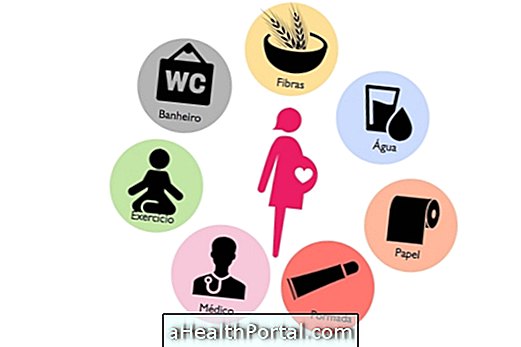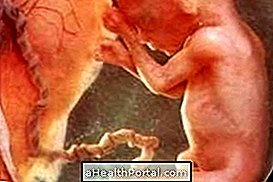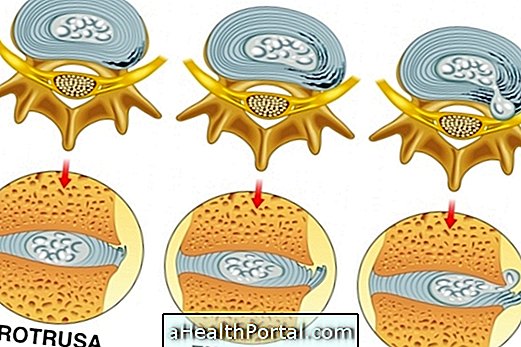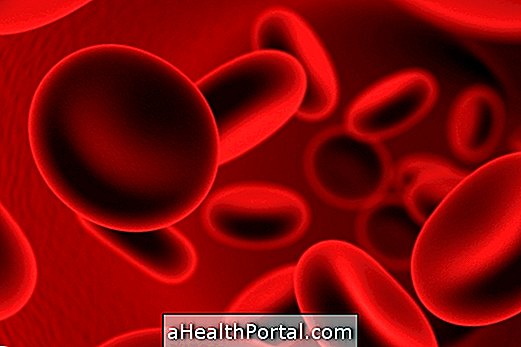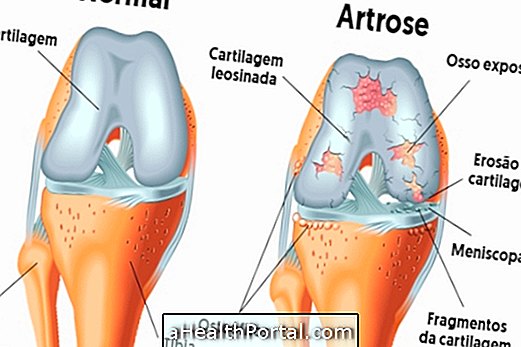Throughout the pregnancy, special attention must be paid to health because some warning signs may appear indicating the presence of complications such as pre-eclampsia and gestational diabetes.
The most common warning signs are increased blood pressure, fever, persistent vomiting, and vaginal bleeding, so it is important to see the doctor to do diagnostic tests and check what is causing the problem.
Here's what to do according to each warning sign:
1. Loss of blood through the vagina
When bleeding occurs during the first trimester, it may be a symptom of miscarriage or ectopic pregnancy.
However, blood loss through the vagina in any trimester of pregnancy can also indicate problems with the placenta or preterm labor, especially when accompanied by abdominal pain or back pain.
What to do: Seek medical attention to evaluate the health of the fetus by ultrasound examination. Also, it is important to have as much rest as possible to avoid further bleeding.
2. Severe headache or blurred vision
Severe or persistent headache or change in vision for more than 2 hours may be symptoms of pre-eclampsia, a complication of pregnancy that is characterized by high blood pressure, bloating of the body and loss of protein by the urine, and which can cause premature delivery or death of the fetus.
What to do: Try to rest and stay in a quiet and dark place, in addition to taking teas to relieve the pain, such as chamomile. However, it is important to see the doctor as soon as possible to assess the pressure and perform Doppler obstetric blood and ultrasound examinations, and promptly initiate appropriate treatment if pre-eclampsia is diagnosed. See more in: How to Fight Headache in Pregnancy.
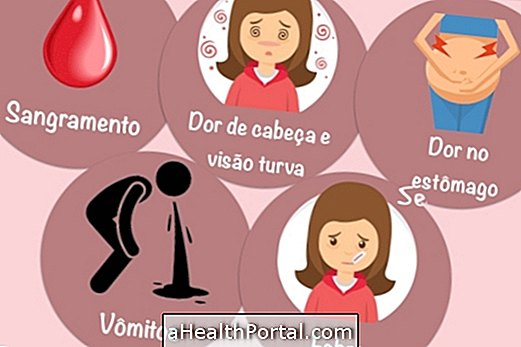
3. Strong and persistent pain in the stomach
If the pain in the stomach is strong and lasts longer than 2 hours, it may also be a sign of preeclampsia, especially if accompanied by other symptoms such as body swelling, headache, or changes in vision.
What to do: To try to relieve the pain, one should take ginger tea and eat light and easily digestible foods, avoiding fried foods, sauces and red meats. However, if symptoms persist for more than 2 hours, seek medical advice.
4. Persistent vomiting
Frequent vomiting can lead to dehydration and impair desirable weight gain in pregnancy and may prevent proper development of the baby.
What to do: To relieve vomiting, you should eat dry, easily digested foods such as unfilled cookies, well-cooked rice, and white bread. One should also take at least 2 liters of water a day, avoid strong seasonings and drink ginger tea in the morning. See more tips on: How to relieve common pregnancy nausea.
5. Fever above 37.5 ° C
High fever can be a symptom of an infection in the body, usually caused by the presence of diseases like influenza or dengue.
What to do: Drinking plenty of fluids, resting, putting compresses of cold water on the head, neck and underarms, and taking acetaminophen usually relieve fever. In addition, it is important to call the doctor and advise about the fever, and if the temperature goes above 39ºC, you should go to the emergency room.
6. Burning or pain when urinating
Burning, pain and urgency to urinate are the main symptoms of urinary tract infection, a disease very common in pregnancy, but that when untreated can cause complications such as premature labor and decreased growth of the baby.
What to do: Drink at least 2 liters of water a day, wash your hands thoroughly before and after using the toilet and do not hold the urine for too long. In addition, one should seek the doctor to prescribe antibiotics to combat the infection and avoid complications. See more about urinary tract infection in pregnancy.
7. Itching or foul-smelling vaginal discharge
Itching or foul-smelling vaginal discharge is an indicator of candidiasis or vaginal infection, common problems in pregnancy due to changes in vaginal pH with the hormones of pregnancy.
What to do: Call your doctor to confirm the diagnosis and start treatment with ointments or antifungal or antibiotic medicines. In addition, it is important to always wear cotton panties and avoid very tight clothing and daily protectors, as they favor the development of infections.

8. Strong pain in the lower part of the belly
The presence of severe pain in the lower part of the belly may be a sign of ectopic pregnancy, miscarriage, preterm labor, fibroids or placenta detachment.
What to do: Seek the doctor to identify what is causing the pain and maintain maximum rest until you start the appropriate treatment.
9. Decreased fetal movements
The absence or abrupt reduction of the baby's movements for at least 12 hours may indicate that the baby is receiving less oxygen or nutrients and may cause premature delivery or neurological problems in the baby.
What to do: Encourage your baby to move, feed herself, walk or lie down with her legs up, but if no movement is detected, you should see the doctor to assess the baby's health through ultrasound. See more in: When the decrease of the baby's movements in the belly is worrisome.
10. Exaggerated weight gain and increased thirst
Excessive weight gain, increased thirst and urge to urinate can be signs of gestational diabetes, a disease that can lead to premature birth and health complications for the baby.
What to do: Get your doctor to take the blood glucose test and start treatment appropriately with changes in diet, use of medications and, if necessary, use of insulin.
It is important to remember that in the presence of any warning signs, even if the symptoms improve, the doctor should be informed so that appropriate treatment is given and follow-up appointments are scheduled to assess the progress of the problem and the baby's health.
